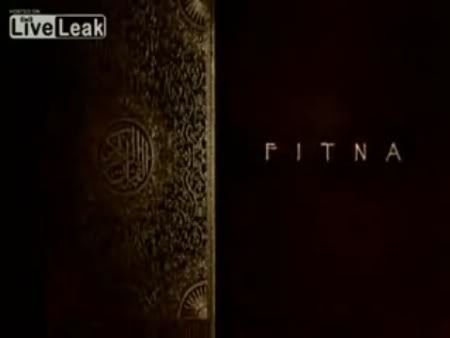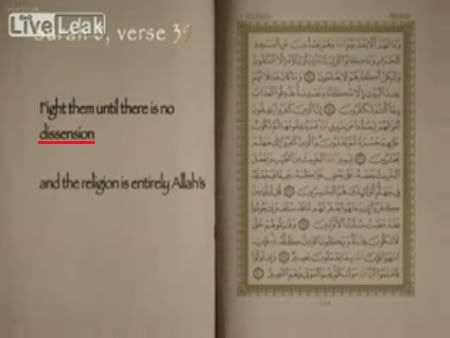Fueling Fitna
Technorati tags: Religion, Islam, Fitna, Geert Wilders
Despite advice from the Dutch government, what did Geert Wilders do? He went ahead and released the controversial short film Fitna. Which has angered a heckuva lot of people the world over, Muslims or otherwise.

So, what's the film about, and why is it potentially this year's Danish Cartoons all over again?
The 15-minute short film essentially takes certain verses from the Quran, and using images and video footage from the media, attempts to montage a message that certain parts of the Quran are responsible for inciting hatred, and indirectly holds them responsible for violence and terrorism perpetrated by Muslims. Further, the claim is made that the mission of Muslims is for world domination. The film also suggests that these parts of the Quran should be excised.
While it's still there, you can view the film in it's entirety on YouTube. Because of YouTube general time limitations, the film has been split into two parts [Part One (9:54 min) and Part Two (6:56 min)]. The film was originally released on the UK-based video-hosting website LiveLeak.com, but was later removed due to concerns for the security and well-being of their staff, following threats they had received.
"Following threats to our staff of a very serious nature, and some ill-informed reports from certain corners of the British media that could directly lead to the harm of some of our staff, LiveLeak.com has been left with no other choice but to remove Fitna from our servers."
(source: CNSNews.com)
However, the film has since been posted on numerous other sites, including YouTube. Welcome to the viral nature of the Internet...
Walski's take? Well, let's just say he's not about to boycott Dutch Lady, or throw his Philips electronics products into the river just yet...
(out of context, and out the window, in the full post)
With all the hype and hoopla surrounding this film, Walski was actually quite disappointed with its amateurish quality and approach. To him, the film represents a gross extrapolation of facts, and the presentation of religious scripture out of context. Done in an amateurish way - it's not gonna get nominated for any achievement awards any time soon.
The sad part about the film, though, is that there are those who have perpetrated acts of violence in the name of Islam. That is a fact no Muslim can run away from. And the images and footage used in the film reflects this sad fact. The brutal acts, and hate speech depicted in the film did actually happen.
Mind you, Walski is not condoning the film in any way, but what will probably get lost in the outrage - responses like the film from Geert Wilders don't just happen. The ammunition used by Wilders has come, sadly, from a portion of the world's Muslim community itself.
And while the blame for the acts of brutality should squarely be placed on those who carried out those acts in the name of their "religion", it's the Quran instead that gets the blame. What Geert Wilders is probably too ignorant to realize is that many acts of brutality associated with Muslims don't even come from the Quran. Like stoning to death for adulterers, female genital mutilation (FGM), throwing gay people off tall buildings... just to name a few attrocities implicated in the film.
In Fitna, Wilders presents 5 verses - in some cases half-verses - which he then links to acts of terror and other general unpleasantries done in the name of "Islam", by various groups from various places. As a technical aside, from comparing various Quranic translations, it would appear that Wilders has used Yusuf Ali's translation.
But all that really sets up the really sneaky part, which is left for last - the first part of verse 39 from surah 8 (Al-Anfal, or The Spoils of War), which is used to provide the impression that Islam calls for world domination. In the film, the verse is presented as
 "Fight them until there is no dissension... and the religion is entirely Allah's"
"Fight them until there is no dissension... and the religion is entirely Allah's"
The actual Yusuf Ali translation reads:
And fight them on until there is no more tumult or oppression, and there prevail justice and faith in Allah altogether and everywhere
Dissension and oppression, as far as Walski can tell, mean two very, very different things. But mistranslation aside, this is then followed by footage (taken from various sources) of individuals saying exactly that: Islam will dominate the world. Granted, if viewed critically, some of the footage has been carefully edited to give it a Wilders' point-of-view context, but the rhetoric of Islamic world domination from those portrayed comes across quite clearly.
But again, it's an extrapolation of a minority view that, from Walski's perspective, really is born out of a sense of hopelessness. This, of course, can be the subject of numerous posts, so Walski won't elaborate on it here.
So yeah, blame Geert Wilders all you want for producing a film that misrepresents Islam. But after viewing the film, one can't help but admit that he got a lot of help from the very people that are feeding his fears.
It would probably be helpful for one to know a bit of where Geert Wilders comes from, and a bit of the political environment of The Netherlands, to understand why this guy is such a write-off. His stand is one of exclusivism - that Europe, for its survival, must remain a Europe untainted by the multiculturalism brought about by emigration. In a country where liberalism is an institution, he is calling for renewed, but selective conservatism - targetted at those he sees as being a "threat" - Muslims. But truth be told, it's not difficult to find examples of how "threatening" Islam is... compile enough examples, and the result is Fitna.
The film ends with this message, displayed, not spoken:
For it is not up to me, but to Muslims themselves to tear out the hateful verses from the Quran.
Muslims want you to make way for Islam, but Islam does not make way for you.
The Government insists that you respect Islam, but Islam has no respect for you.
Islam wants to rule, submit and seeks to to destroy our wstern civilization.
In 1949, Nazism was defeated in Europe.
In 1989, communism was defeated in Europe.
Now, the Islamic ideology has to be defeated.
So here's the deal with this film, from how Walski sees it:
Does the film misrepresent Islam and uses Quranic verses out of context to prove a point? Answer: Yes.
Does Geert Wilders have a political agenda? Answer: Yes (he's actually seen as a far-right wing-nut in his home country).
Is what's represented in the film a true reflection of Islam? Answer: No - but it is an accurate reflection of how religion can be a powerful tool to drive some people to do insane and inhuman things - not just Islam, but any religion.
Is the film deliberately anti-Islam? Answer: Yes - but only from the perspective of one xenophobic ultra-right wing legislator from The Netherlands. And he got a lot of help from extremists doing what they do in the name of "Islam".
In the final analysis, as outrageous as Fitna is, Walski thinks that there is some positivity for Muslims, if we dared to think critically: extremism of any kind is damaging. All of the verses portrayed in the film, taken in their correct context, bear one common message - they all underline God's infinite mercy, and implore mankind to be forgiving. Look them up for yourself, and read them in their proper context (the full list is in the footnote below).
Sure, condemn the film. In fact, you should condemn it. Walski, however, hopes that no Muslim gets so pissed off that they lose their senses and do something that does nothing more than proving Wilders right in the first place.
But at the same time, while you condemn the film, you should also condemn the examples that constitute the fuel for Wilder's Fitna. Without which, none of this nonsense would've come about... not in the wildest of Geert Wilders' dreams.
Walski's Quranic referential footnote: As mentioned, 5 verses were used in the film. All the five are listed here, in order of appearance. Where indicated, partial verses were used.
- Surah 8 (Al-Anfal, or The Spoils of War), verse 60 - partial
- Surah 4 (Al-Nisa', or The Women), verse 56
- Surah 47 (Muhammad), verse 4 - partial
- Surah 4, verse 89
- Surah 8, verse 39 - very partial
By the way, the Arabic word fitna means "discord or disagreement among people". In Malaysia, it is a commonly used word, but in the context of "malicious lies"... which Walski thought was an interesting coincidence.
















